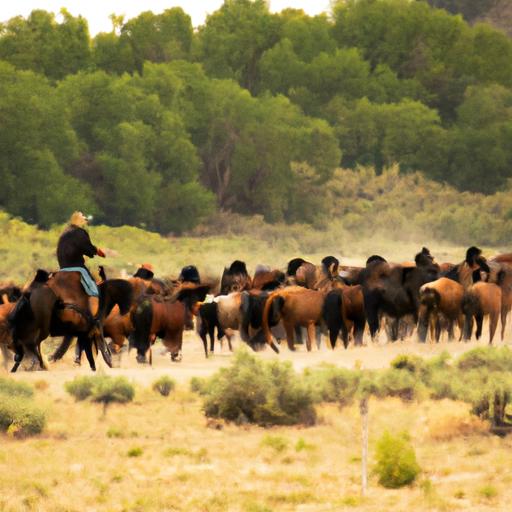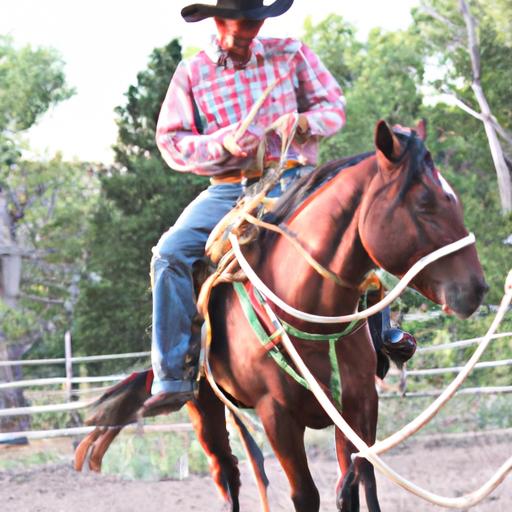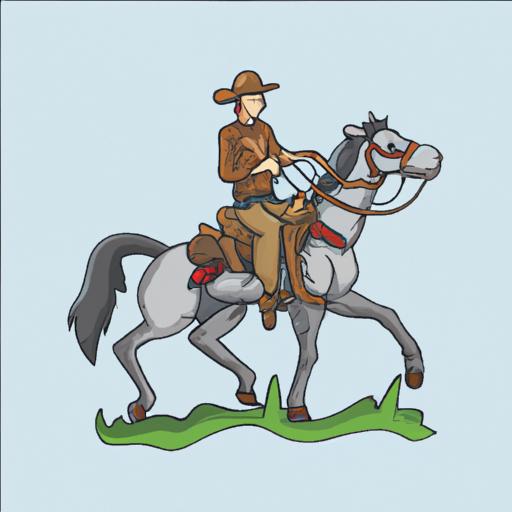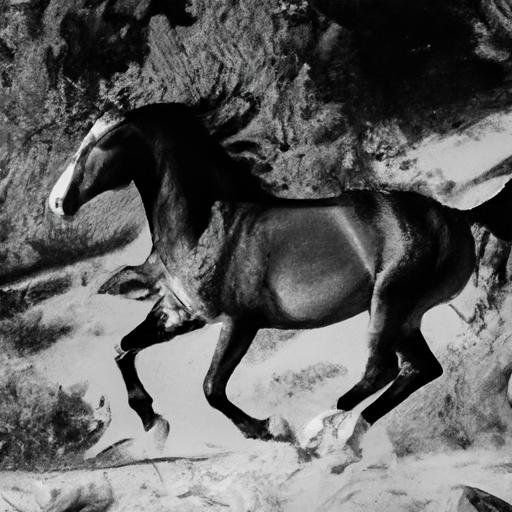Uncover the diverse horse breeds used by cowboys in this captivating exploration of their history, characteristics, and suitability. A must-read for cowboy enthusiasts!
Introduction
When we think of cowboys, our minds conjure images of rugged individuals skillfully maneuvering through vast open plains, their trusted steeds carrying them with grace and power. Horses have been an integral part of cowboy culture for centuries, playing a pivotal role in their daily activities and shaping the very essence of their way of life. In this article, we will explore the importance of horse breeds in cowboy culture and delve into the fascinating world of horse breeds used by cowboys.
As a cowboy enthusiast, you might wonder, why are horse breeds so crucial in this unique culture? Well, the answer lies in the demanding nature of the cowboy’s work. From herding cattle to roping and navigating treacherous terrains, cowboys rely on their horses to be their steadfast companions, demonstrating unwavering strength, agility, and loyalty.
Overview
In this captivating journey, we will uncover the history of cowboys and their deep connection with horses. We will traverse through time, exploring the evolution of horse breeds used by cowboys, discovering how these magnificent creatures have adapted and evolved alongside their cowboy counterparts.
But that’s not all. We will also shed light on the characteristics that make an ideal horse breed for a cowboy. We’ll examine the physical traits necessary for traversing rugged terrains, the temperament and trainability factors that make a horse a cowboy’s best friend, and the specific skills and abilities desired in these noble creatures.
So, saddle up and get ready to embark on an exhilarating exploration of the horse breeds used by cowboys. Together, we will discover the versatility and suitability of these breeds in the challenging world of the cowboy. From the iconic American Quarter Horse to the agile and nimble Appaloosa, each breed brings its unique set of qualities to the table.
In this enthralling journey, you’ll gain a deeper understanding of the roles these horse breeds play in cowboy culture and the factors to consider when selecting the perfect equine companion. So, let’s dive into the heart of cowboy culture and uncover the secrets of horse breeds used by cowboys.
Stay tuned for the next section where we’ll dive into the captivating history of cowboys and their reliance on horses.
History of Cowboys and Horses

A Brief History of Cowboys and Their Reliance on Horses
To truly understand the significance of horse breeds in cowboy culture, we must delve into the rich history of cowboys and their inseparable bond with horses. Cowboys, often romanticized as iconic figures of the American West, emerged in the 19th century as skilled cattle handlers and ranchers. But it was their reliance on horses that enabled them to thrive in the rugged and expansive landscapes they called home.
In the early days, cowboys roamed vast territories, herding cattle across seemingly endless plains. Horses became their trusted partners, aiding them in the arduous task of managing and moving herds. These equine companions allowed cowboys to cover great distances with remarkable speed, as well as navigate through treacherous terrains that would have been nearly impossible on foot. The cowboy and his horse became a formidable team, working together in harmony to accomplish their tasks.
The Evolution of Horse Breeds Used by Cowboys Over Time
As cowboys continued to adapt and refine their techniques, the need for horses that were specifically suited to their demanding lifestyle became evident. Thus, the evolution of horse breeds used by cowboys began. Over time, cowboys sought out horses with traits that made them excel in their unique line of work.
During the early days, cowboys relied on sturdy and agile breeds such as the Mustang and the Criollo, which were descendants of the Spanish horses brought to the Americas by European settlers. These horses exhibited endurance and adaptability, traits necessary for surviving on the vast and often harsh landscapes of the American West.
As the cattle industry grew and cowboys faced new challenges, horse breeds were selectively bred to meet their evolving needs. The American Quarter Horse emerged as a popular choice, thanks to its exceptional speed, agility, and versatility. Its ability to sprint short distances and make quick turns made it ideal for activities like roping and cutting cattle.
With the passage of time, other horse breeds like the Appaloosa, Paint Horse, and various crossbreeds gained popularity among cowboys due to their unique characteristics and suitability for specific tasks. Today, there exists a diverse range of horse breeds that cater to the varied requirements of cowboys, each breed contributing its own set of strengths to this storied culture.
In the next section, we’ll explore the characteristics that make an ideal horse breed for cowboys, from their physical traits to their temperament and specific skills.
Characteristics of Ideal Horse Breeds for Cowboys

A. Physical Traits Required for Working in Rugged Terrains
When it comes to working in the rugged and demanding terrains that cowboys often encounter, certain physical traits are crucial for a horse to excel in their role. One of the most important attributes is endurance. Cowboys need horses that can cover long distances without tiring easily, as their work often involves traversing vast expanses of land. Additionally, a sturdy build and strong musculature are essential for navigating uneven terrain and carrying the weight of a rider and equipment.
Another physical trait that proves invaluable in rugged terrains is surefootedness. Horses with a natural sense of balance and agility are better equipped to handle challenging landscapes, including steep inclines, rocky surfaces, and slippery slopes. This attribute not only ensures the safety of both horse and rider but also aids in maneuvering through tight spaces or dense vegetation.
B. Temperament and Trainability Factors for a Cowboy’s Horse
A cowboy’s horse must possess the right temperament and trainability to handle the demands of their work. Calmness under pressure is a highly desirable trait, as it allows the horse to remain focused and composed in potentially stressful situations, such as herding cattle or encountering unexpected obstacles. Additionally, a willingness to learn and respond to commands is crucial, as cowboys rely on effective communication with their horses to carry out their tasks efficiently.
Alongside temperament, trainability plays a vital role in a cowboy’s horse. Horses that are quick to learn and adapt to new tasks or techniques are invaluable assets to cowboys. They can be trained to respond to specific cues and commands, making their work more seamless and harmonious. A trainable horse not only enhances the partnership between horse and rider but also contributes to the overall efficiency and effectiveness of the cowboy’s work.
C. Specific Skills and Abilities Desired in a Cowboy’s Horse
In the realm of cowboy culture, certain skills and abilities are highly sought after in a horse. For example, the aptitude for cattle herding is of utmost importance. A cowboy’s horse should possess the instinct and agility to anticipate the movements of cattle, assist in separating them, and help maintain control over the herd. The ability to work with a rope is another valuable skill, as roping is a fundamental technique used by cowboys for various tasks such as catching stray cattle or securing animals for medical treatment.
Furthermore, a horse with a calm and steady demeanor around livestock is highly desirable. This characteristic reduces the risk of spooking or agitating the animals, ensuring a smoother and more efficient workflow for the cowboy. Other desired abilities may include speed for chasing down stray cattle, agility for navigating tight spaces, and intelligence for problem-solving in challenging situations.
In the next section, we will delve into the captivating world of popular horse breeds in cowboy culture. Get ready to explore the distinctive features and benefits that each breed brings to the table, as we uncover the diverse range of horse breeds used by cowboys.
Stay tuned for the next section where we’ll explore the popular horse breeds in cowboy culture.
Popular Horse Breeds in Cowboy Culture

A. Listing and Description of Various Horse Breeds Used by Cowboys
When it comes to horse breeds used by cowboys, there is a diverse array of options, each with its own unique characteristics and strengths. Let’s explore some of the most popular horse breeds that have become synonymous with cowboy culture:
1. American Quarter Horse
The American Quarter Horse, renowned for its speed and agility, is a staple in the world of cowboys. With a compact and muscular build, this breed excels in tasks such as roping and cutting cattle. Its calm disposition and intelligence make it a reliable companion for long days on the range.
2. Appaloosa
The Appaloosa, known for its striking coat patterns and endurance, is a versatile breed highly valued by cowboys. With exceptional agility and surefootedness, Appaloosas are ideal for navigating rough terrains. Their calm temperament and intelligence make them excellent partners for herding and pleasure riding alike.
3. Paint Horse
Paint Horses, with their eye-catching coat patterns and sturdy build, are highly sought after in cowboy circles. Renowned for their versatility, these horses excel in tasks such as cutting, roping, and even trail riding. Their gentle nature and athleticism make them a favorite among cowboys and ranchers.
4. Mustang
The Mustang, descended from wild horses, holds a special place in cowboy culture. Known for their hardiness and endurance, Mustangs are well-suited for long days of work on the open range. With their natural instincts intact, they exhibit remarkable adaptability and intelligence, making them valuable partners for cowboys.
B. Highlighting the Key Features and Benefits of Each Breed
Each horse breed used by cowboys brings a unique set of features and benefits to the table. Here are some key highlights:
- American Quarter Horse: Speed, agility, and intelligence make it perfect for tasks like roping and cutting cattle.
- Appaloosa: Striking coat patterns, endurance, and surefootedness make it an excellent choice for navigating rugged terrains.
- Paint Horse: Eye-catching coat patterns, versatility, and athleticism make it suitable for various tasks, including cutting and roping.
- Mustang: Hardiness, endurance, and adaptability make it an ideal partner for long days of work on the open range.
By understanding the distinct characteristics of these popular horse breeds, cowboys can choose the perfect equine companion that aligns with their specific needs and preferences. The bond between a cowboy and their trusted horse is one that embodies the true essence of cowboy culture, where partnership and reliance on these magnificent creatures form the heart and soul of their way of life.
Stay tuned for the next section where we’ll explore the versatility and suitability of horse breeds for cowboys.
Versatility and Suitability of Horse Breeds for Cowboys
Discussing the Adaptability of Different Horse Breeds in Cowboy Activities
When it comes to cowboy activities, adaptability is key. Different horse breeds exhibit varying levels of adaptability, allowing them to excel in specific tasks. Some breeds are known for their speed and agility, making them ideal for events like roping and barrel racing. Others possess remarkable endurance, enabling them to withstand long hours of herding and working cattle. It is essential to understand the unique characteristics of each breed to determine their suitability for specific cowboy activities.
Exploring the Specific Roles Each Breed May Excel In
Every horse breed has its strengths and shines in particular roles within the cowboy world. Let’s take a closer look at some of the prominent horse breeds used by cowboys and the roles they excel in:
1. American Quarter Horse
The American Quarter Horse, known for its speed and versatility, is considered the epitome of a cowboy’s horse. This breed excels in activities such as barrel racing, roping, and cutting cattle with its quick bursts of speed and exceptional maneuverability.
2. Appaloosa
Appaloosas are renowned for their striking coat patterns and agility. Their sure-footedness and endurance make them ideal for navigating through rough terrains, making them valuable assets for cowboys working in mountainous regions.
3. Paint Horse
Paint Horses, with their eye-catching coat patterns and versatile nature, are highly sought after by cowboys. Their athleticism and intelligence make them well-suited for a variety of tasks, including herding, roping, and pleasure riding.
4. Morgan
Morgans are known for their compact yet sturdy build, making them excellent all-around horses for cowboys. Their versatility allows them to excel in various disciplines, including ranch work, pleasure riding, and even competitive events like endurance riding.
Factors to Consider When Selecting a Horse Breed for Cowboy Work
When selecting a horse breed for cowboy work, several factors come into play. Consider the following:
a. Temperament and Trainability
A cowboy’s horse should possess a calm and trainable temperament. It is crucial to choose a breed that is known for its willingness to work and ability to handle the demands of cowboy activities.
b. Physical Attributes
The physical attributes of a horse, such as size, strength, and endurance, should align with the specific tasks required in cowboy work. A horse with the appropriate build and stamina will be better equipped to handle the challenges of herding cattle or participating in roping events.
c. Experience and Skill Level
Matching the horse’s experience and skill level to the cowboy’s own abilities is vital for a successful partnership. A seasoned cowboy may be able to handle a more spirited and challenging horse, while a novice cowboy may require a more forgiving and patient mount.
By considering these factors, cowboys can select a horse breed that perfectly complements their needs and enhances their performance in the cowboy way of life.
Stay tuned for the next section where we’ll explore the popular horse breeds in cowboy culture and highlight their key features and benefits.


